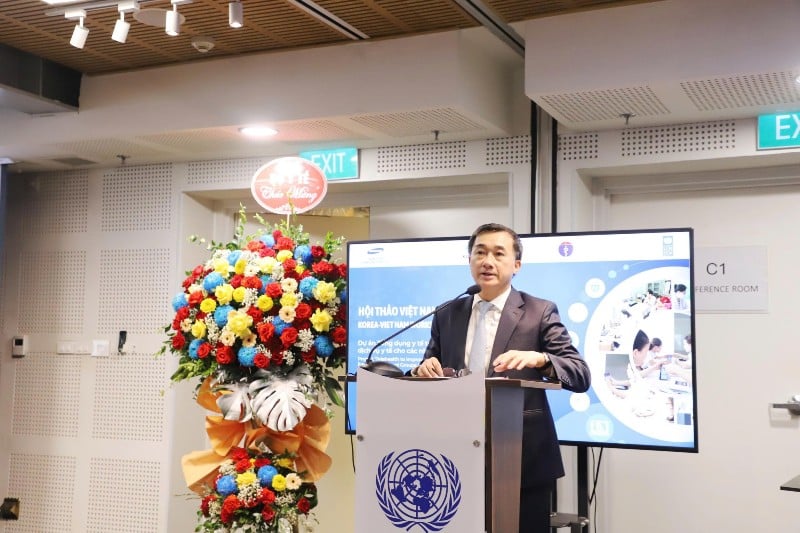The event marks an important step forward in the process of modernizing the health system, strengthening grassroots capacity through technology application and international cooperation.
 |
| Prof. Dr. Tran Van Thuan, Deputy Minister of Health . |
Speaking at the opening of the workshop, Prof. Dr. Tran Van Thuan, Deputy Minister of Health, emphasized that telemedicine is one of the clearest manifestations of modern medicine, where technology is applied to ensure equity and expand access to health care for all people, especially in remote and disadvantaged areas.
Since 2020, the Ministry of Health has strongly implemented the Telemedicine Project with more than 1,000 points nationwide, contributing to saving the lives of thousands of patients and maintaining medical activities during the Covid-19 pandemic.
According to Deputy Minister Tran Van Thuan, this workshop was held in a very favorable context when our Party and State are strongly promoting digital transformation, deep international integration and perfecting institutions in high-tech application fields.
Resolution No. 57-NQ/TW (December 22, 2024) affirms that digital transformation is one of the strategic breakthroughs, while Resolution No. 59-NQ/TW (January 24, 2025) on international integration emphasizes comprehensive cooperation with foreign partners, especially in the health sector.
The recent Resolution No. 66-NQ/TW on innovation in law-making continues to pave the way for the institutionalization of remote medical examination and treatment, medical data security, and cashless payments, the pillars of a modern digital healthcare ecosystem.
The project sets out three specific objectives: developing technical documents and standard procedures for telemedicine, enhancing the capacity of the grassroots health system through investment in information technology and human resource training, and promoting the use of telemedicine services in the community, especially among the poor, ethnic minorities and patients with chronic diseases such as hypertension and tuberculosis.
At the end of his speech, the Deputy Minister of Health requested that the units under the Ministry and the Departments of Health participating in the project continue to coordinate closely, summarize the implementation practices to propose the completion of policies, financial and technical mechanisms, and ensure sustainable integration of the telemedicine model into the national health system.
He also expressed his hope that the discussion sessions at the workshop would be an opportunity to share experiences, remove obstacles and promote public-private cooperation in public health care.
According to Deputy Director of the Department of Medical Examination and Treatment Management (Ministry of Health) Nguyen Thanh Ha, from 2020 to present, the Ministry of Health has coordinated with the United Nations Development Program (UNDP) and the Korea International Health Care Organization (KOFIH) to deploy a telemedicine system through the software "Doctor for every home", aiming to enhance the capacity of grassroots health care.
This is a digital technology platform that allows medical staff and patients to interact, exchange information, support diagnosis and treatment advice through an online environment.
The project is being implemented in three phases. The first phase focuses on piloting in three districts in three mountainous provinces including Ha Giang, Bac Kan and Lang Son. The second phase continues to upgrade software, hardware infrastructure and replicate the model in five provinces affected by climate change (Thua Thien Hue, Quang Ngai, Binh Dinh, Dak Lak and Ca Mau), bringing the total number of participating provinces to eight.
From 2024 to 2026, phase three will be launched with the expansion of implementation in ten mountainous, remote and isolated provinces such as Lao Cai, Lai Chau, Yen Bai, Tay Ninh, Hau Giang and Ben Tre, while comprehensively upgrading the system, including IT infrastructure, human resource training and building a legal corridor.
The total project cost is over 2.7 million USD, funded by KOFIH and implemented in coordination with UNDP. System data is securely stored on servers located at the National Health Information Center (Ministry of Health) and at five local Health Departments.
Commune health stations are equipped with essential information technology equipment, software platforms that can be upgraded and integrated with existing databases such as V-Telehealth and personal health record systems.
However, the project is also facing many challenges such as lack of detailed legal guidance on health insurance payments for telemedicine services, uneven information technology infrastructure, lack of specialized equipment at the facility and limitations in sharing medical data.
To overcome these shortcomings, the Ministry of Health has been actively perfecting the legal framework with documents such as the Law on Medical Examination and Treatment No. 15/2023/QH15, effective from January 2024, Decree 96/2023/ND-CP and Circular 30/2023/TT-BYT, creating a solid foundation for the development of digital healthcare.
Source: https://baodautu.vn/tang-cuong-tiep-can-y-te-cho-nhom-yeu-the-qua-mo-hinh-bac-sy-cho-moi-nha-d314430.html




















































![[Maritime News] More than 80% of global container shipping capacity is in the hands of MSC and major shipping alliances](https://vphoto.vietnam.vn/thumb/402x226/vietnam/resource/IMAGE/2025/7/16/6b4d586c984b4cbf8c5680352b9eaeb0)













































Comment (0)